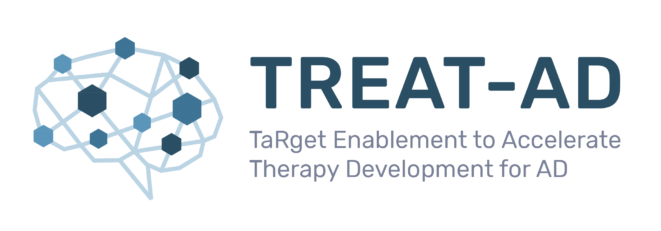Catalyzing Diversity in Alzheimer’s Disease Target Discovery Through Open Science
By Lara Mangravite
Sage Bionetworks
Welcome!

We want to introduce you to a new project called the TREAT-AD Center. This is an open-science initiative focused on generating high-quality reagents for validation of a wide-range of emerging Alzheimer’s disease (AD) drug targets. This project is a mash-up of open-science advocates, medicinal chemists, structural biologists, assay experts, bioinformaticians and, of course, neuroscientists. We are united in our belief that clinical care for treatment and prevention of Alzheimer’s disease will be possible only when we have multiple drugs available that operate across multiple disease-causing biological pathways.
The shadow of AD on our society is growing longer. By 2050, there will be an estimated 150 million cases world-wide and caring for these patients will exact a tremendous societal and economic toll. Because AD is a complex and dynamic disease, researchers expect it will require multiple, complementary treatment strategies to meet the demands of our society.
The field of AD research has set out over the last decade to identify new target hypotheses to complement current ongoing drug discovery work. The combined power of the genomics and artificial intelligence (AI) revolutions have aided this work. We are now able to develop systems biology models of disease from multi-layered molecular data collected directly from people experiencing this terrible disease. These inquiries confirm that AD is a dynamic and heterogeneous disease – and raise the urgency that we need a range of therapeutic approaches to care for patients. By using a systems biology and bioinformatic analyses approach, we can search for multiple ideal targets to perturb for potential AD drug development versus one target at a time.
Although systems biology and other informatic approaches have identified potential AD target hypotheses, these are not easy for biologists to study. For one, the basic reagents needed to perform biological experiments have not yet been developed. Developing reagents can add years to the research cycle. This makes understudied proteins a risky choice for scientists, who are judged based on intellectual productivity. To accelerate this process, our center is committed to sharing data and reagents rapidly, openly, and without restriction. We believe that target validation takes the work of many scientists in many labs and providing reagents openly will support a range of complementary research. This approach will advance understanding of the disease in important ways that may yet lead to promising treatments.
So, that’s our approach. This blog will provide transparency for the Emory-Sage-SGC TREAT-AD Center’s processes to encourage and enable you to pursue independent studies using the resources we generate in novel areas of AD. We will post information about our process for identifying novel targets, target portfolio, experimental data, tool generation, and communications relating to the work happening across the center and community engagement.
We invite you to follow along!
